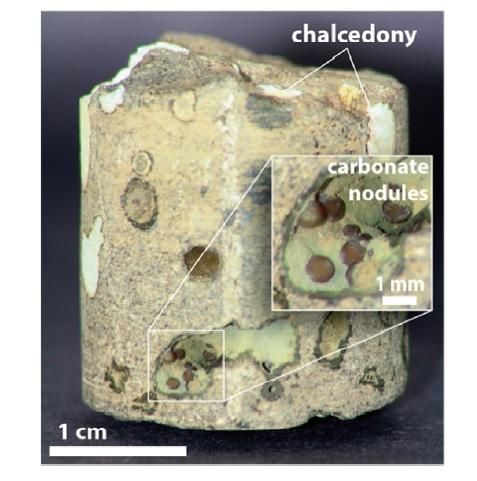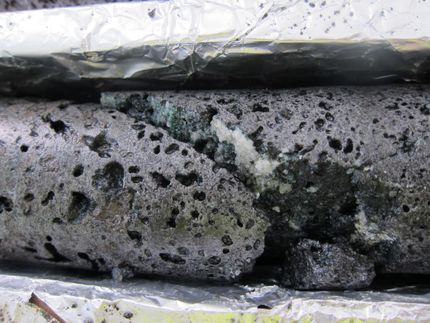Carbon dioxide tucked into basalt converts to rock
Advertisement
In November, the Paris Climate Agreement goes into effect to reduce global carbon emissions. To achieve the set targets, experts say capturing and storing carbon must be part of the solution. Several projects throughout the world are trying to make that happen. Now, a study on one of those endeavors has found that within two years, carbon dioxide (CO2) injected into basalt transformed into solid rock.

A core sample from a carbon storage project in Washington state showed that carbon dioxide injected deep underground into basalt rock turned into the carbonate mineral ankerite in less than two years (inset).
American Chemical Society
Lab studies on basalt have shown that the rock, which formed from lava millions of years ago and is found throughout the world, can rapidly convert CO2 into stable carbonate minerals. This evidence suggests that if CO2 could be locked into this solid form, it would be stowed away for good, unable to escape into the atmosphere. But what happens in the lab doesn't always reflect what happens in the field. One field project in Iceland injected CO2 pre-dissolved in water into a basalt formation, where it was successfully stored. And starting in 2009, researchers with Pacific Northwest National Laboratory and the Montana-based Big Sky Carbon Sequestration Partnership undertook a pilot project in eastern Washington to inject 1,000 tons of pressurized liquid CO2 into a basalt formation.
After drilling a well in the Columbia River Basalt formation and testing its properties, the team injected CO2 into it in 2013. Core samples were extracted from the well two years later, and Pete McGrail and colleagues confirmed that the CO2 had indeed converted into the carbonate mineral ankerite, as the lab experiments had predicted. And because basalts are widely found in North America and throughout the world, the researchers suggest that the formations could help permanently sequester carbon on a large scale.























































